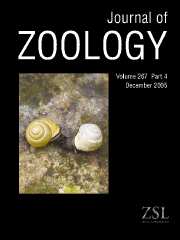Crossref Citations
This article has been cited by the following publications. This list is generated based on data provided by
Crossref.
McDonald, R. A.
Day, M. J.
and
Birtles, R. J.
2001.
Histological evidence of disease in wild stoats (Mustela erminea) in England.
Veterinary Record,
Vol. 149,
Issue. 22,
p.
671.
King, C. M.
Griffiths, K.
and
Murphy, E. C.
2001.
Advances in New Zealand mammalogy 1990–2000: Stoat and weasel.
Journal of the Royal Society of New Zealand,
Vol. 31,
Issue. 1,
p.
165.
McDonald, Robbie A.
2002.
Resource partitioning among British and Irish mustelids.
Journal of Animal Ecology,
Vol. 71,
Issue. 2,
p.
185.
King, Carolyn M.
2002.
Cohort variation in the life-history parameters of stoatsMustela erminea in relation to fluctuating food resources: a challenge to boreal ecologists.
Acta Theriologica,
Vol. 47,
Issue. 3,
p.
225.
Mcdonald, Robbie A.
and
Harris, Stephen
2002.
Population biology of stoats Mustela erminea and weasels Mustela nivalis on game estates in Great Britain.
Journal of Applied Ecology,
Vol. 39,
Issue. 5,
p.
793.
de Marinis, Anna Maria
and
Masseti, M.
2003.
The weasel (Mustela nivalis) on the Mediterranean islands.
Mammalian Biology,
Vol. 68,
Issue. 3,
p.
181.
Purdey, D. C.
King, C. M.
and
Lawrence, B.
2004.
Age structure, dispersion and diet of a population of stoats (Mustela erminea) in southern Fiordland during the decline phase of the beech mast cycle.
New Zealand Journal of Zoology,
Vol. 31,
Issue. 3,
p.
205.
Muñoz‐Garcia, Agustí
and
Williams, Joseph B.
2005.
Basal Metabolic Rate in Carnivores Is Associated with Diet after Controlling for Phylogeny.
Physiological and Biochemical Zoology,
Vol. 78,
Issue. 6,
p.
1039.
Martins, E. G.
Bonato, V.
Pinheiro, H. P.
and
Dos Reis, S. F.
2006.
Diet of the gracile mouse opossum (Gracilinanus microtarsus) (Didelphimorphia: Didelphidae) in a Brazilian cerrado: patterns of food consumption and intrapopulation variation.
Journal of Zoology,
Vol. 269,
Issue. 1,
p.
21.
Elmeros, Morten
2006.
Food habits of stoatsMustela erminea and weaselsMustela nivalis in Denmark.
Acta Theriologica,
Vol. 51,
Issue. 2,
p.
179.
WHITE, PIRAN C. L.
and
KING, CAROLYN M.
2006.
Predation on native birds in New Zealand beech forests: the role of functional relationships between Stoats Mustela erminea and rodents.
Ibis,
Vol. 148,
Issue. 4,
p.
765.
Hellstedt, P.
and
Henttonen, H.
2006.
Home range, habitat choice and activity of stoats (Mustela erminea) in a subarctic area.
Journal of Zoology,
Vol. 269,
Issue. 2,
p.
205.
Remonti, Luigi
Balestrieri, Alessandro
and
Prigioni, Claudio
2007.
Role of fruits in the diet of small mustelids (Mustela sp.) from the western Italian Alps.
European Journal of Wildlife Research,
Vol. 53,
Issue. 1,
p.
35.
Sidorovich, Vadim E.
and
Solovej, Irina A.
2007.
The stoatMustela ermineapopulation decline in northern Belarus and its consequences for weaselsMustela nivalis.
New Zealand Journal of Zoology,
Vol. 34,
Issue. 1,
p.
9.
Zalewski, Andrzej
2007.
Does size dimorphism reduce competition between sexes? The diet of male and female pine martens at local and wider geographical scales.
Acta Theriologica,
Vol. 52,
Issue. 3,
p.
237.
Sidorovich, Vadim E.
Polozov, Alexey G.
and
Solovej, Irina A.
2008.
Niche separation between the weasel Mustela nivalis and the stoat M. erminea in Belarus.
Wildlife Biology,
Vol. 14,
Issue. 2,
p.
199.
MACDONALD, MICHAEL A.
and
BOLTON, MARK
2008.
Predation on wader nests in Europe.
Ibis,
Vol. 150,
Issue. s1,
p.
54.
Schipper, Aafke M.
Loos, Mark
Ragas, Ad M. J.
Lopes, João P. C.
Nolte, Boris T.
Wijnhoven, Sander
and
Leuven, Rob S. E. W.
2008.
Modeling the influence of environmental heterogeneity on heavy metal exposure concentrations for terrestrial vertebrates in river floodplains.
Environmental Toxicology and Chemistry,
Vol. 27,
Issue. 4,
p.
919.
Rosalino, Luís M.
Santos, Maria J.
Pereira, Iris
and
Santos-Reis, Margarida
2009.
Sex-driven differences in Egyptian mongoose’s (Herpestes ichneumon) diet in its northwestern European range.
European Journal of Wildlife Research,
Vol. 55,
Issue. 3,
p.
293.
Šálek, Martin
Kreisinger, Jakub
Sedláček, František
and
Albrecht, Tomáš
2010.
Do prey densities determine preferences of mammalian predators for habitat edges in an agricultural landscape?.
Landscape and Urban Planning,
Vol. 98,
Issue. 2,
p.
86.


